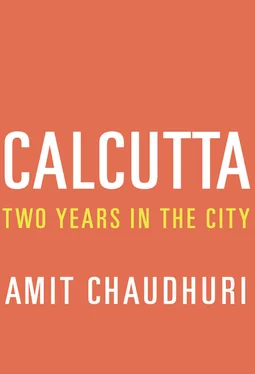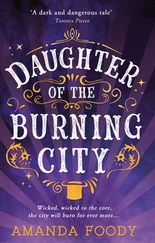I made from the David Hare College for Park Street. A young writer friend with two well-received books to his name — I’ll call him “Salim”—had emailed me a few days earlier about visiting Calcutta; it would be his second visit to the city. Salim lived in Delhi and England and other places, and I presumed he was covering the elections for a British newspaper. But, in the last day, I’d been getting frantic texts about a bad stomach; the messages conveyed the panic of being in a city where one doesn’t know anyone who knows any doctors. Then the message language had stabilised; medication had been administered, and, tomorrow (election day), Salim would leave for less unsettling territory: Bombay. I wondered if he were too weak now to meet me; but a text told me that company was what he craved.
Salim was lying recumbent in his air-conditioned room in Park Mansions when I finally saw him; he had a visitor at the bedside — a middle-aged, stocky gentleman, someone who, in his matter-of-fact gentleness, was again out of Calcutta’s past, like the Port Trust’s Mr. Chakrabarty. Salim thanked the man profusely when he took his leave soon after I’d entered the room. Park Mansions was a block of colonial flats with a compound, hidden from the main road (which was Free School Street), very still and charming at this time of the evening. To step on the wooden floorboards at the entrance, walk towards the old lift, and to ring the bell and be let in by the caretaker was, to me at least, full of history and promise.
“It’s a lovely place,” I said, to which Salim smiled and said, “Ye-e-s,” sceptically, as if he were weighing my remark. We discussed, for a bit, the nuances of a habitation such as this one — what was it that kept it from having a dull, numbed, governmental quality? Past privilege is what it exuded; but present well-being too. There was still money here; it was quietly in possession of the old building. It had the walls painted a white that looked silken in the lamplight. What was it about white walls — here; or in old institutional buildings in London; or nursing homes for the convalescent to recuperate in — that had a safe, patrician glow?
“So what are you doing here?” I asked. “I’m not actually sure,” he confessed. “Yesterday, I was following a campaign trail in Barrackpore, asking people questions. Then I began to feel very ill.” “I wasn’t feeling so good myself yesterday — it was horribly humid all of a sudden,” I said. “Was it something you ate here?” He quickly wanted to absolve the city of guilt. “You know, I don’t think so. I think it’s an infection I had earlier that hasn’t gone away.”
We had slipped, unbeknownst to him, and without self-consciousness on my part, into what for Bengalis is a returning subject of conversation: the state of their digestion. The English are supposed to open conversations with the weather, and then reference it again as a sort of join or punctuation between one thought and another: it sounds ridiculous, but is largely true. It’s their daily, sometimes hourly, reassessment of the fact of existence — something that neither their religion, work, nor education any more expects from them. Bengalis talk constantly about food to express an irrational joie de vivre in the midst of a jaded present; and they speak of their digestion — especially a mysterious complaint called “gas,” or gash —to register melancholy, a persistent dissatisfaction with life. This phenomenon, which has been studied by a German sociologist, Stefan Ecks, explains the constant outflow of antacids and cures for dyspepsia, like Gelusil and Aqua-ptychotis, and laxatives such as Isabgol and Dulcolax, from pharmacists’ shelves in Calcutta: these are actually a curious kind of mood-enhancer, a crutch to the Bengali mind. Dyspepsia is the curse of the sedentary man, who probably appears in Calcutta well before Macaulay speaks of his intention of conjuring up “a class of persons Indian in blood and colour, but English in tastes, in opinions, in morals and in intellect.”
“What’s the situation like out there?” I asked Salim.
“Not good at all,” he said, shaking his head grimly. “I had the sense that people are in a state of despair, that they’re really between a rock and a hard place.”
“Did you talk to anyone interesting?”
“Well, I was following this guy around — Dinesh Trivedi.” General Secretary of the All India Trinamool Congress, MP from Barrackpore, Trivedi was the Trinamool’s conciliatory (and non-Bengali) face. “I liked him,” said Salim. “He was open and made no bones about the fact that steering the state in the right direction under Trinamool wouldn’t be a straightforward thing.”
I was interested in this portrayal. I’d met Trivedi several times at Manoj’s parties, and our encounters were brief and unmemorable. We had to be reintroduced each time by Manoj, and behave as if there had never been a previous meeting.
“So is this for a piece, then?” I persisted.
“I thought I might have written something — but now …” Salim waved at himself in the bed, “I’ve given up the idea. Anyway, I like being here, I like this city. I thought it would be good to spend some time here.”
I’m intrigued by this admission of admiration for Calcutta from friends visiting from Europe and America; they often tell me it’s the Indian city they like best. Although I feel like an outsider to Calcutta myself, with hardly any close friends here, I must have become both inured to and invested enough in it to not be able to experience it as they do. I find today’s Calcutta intriguing myself, but for altogether different reasons; and, as I’ve pointed out before, I’m haunted and impeded by my childhood vision of it in the sixties and seventies, when it was a great city. What must it look like today to the visitor? I try again and again to perform the imaginative feat, to put myself in his or her place, but can’t quite succeed. Akhil Sharma’s quizzical but considered “You feel something must have happened here” is the only clue I have to what appears before the visitor’s eye.
“Besides, I felt like my writing was closing up — I felt like I needed to get out,” he said. “Do you feel like that sometimes? That actually going somewhere new, getting ‘out there,’ might get your writing flowing again?”
Despite being a very good writer, Salim is attractively ingenuous; you feel protective towards him and his queries, whether or not he has a stomach bug, or is in need of a doctor — there’s a raw freshness to the persona.
I could see “going out into the world” as a Hemingway-like ploy; the writer as explorer and operative, undertaking an excursion specifically in the interests of surviving, remaining alive, as a writer. I didn’t see Salim as a Hemingway-type figure, though — there was an Indian softness about him which set him apart from Hemingway’s hard, sentimental individualism; a softness that hinted at dependency — possibly a mother he was close to.
I myself had never consciously adopted “going out into the world” as a programme for rejuvenation, and I said as much to Salim. “In fact,” and I was thinking aloud for the first time about this in the room in Park Mansions, “I can feel trapped in the whole business of writing, especially writing fiction, and have in the past. I find that what works best for me is a different kind of travel: between genres — into the essay, or story, or into music. I can’t stay with one genre, especially with the novel, for very long. I feel restless, and must move in another direction — which is usually another form.”
Salim took this in with limpid receptivity; but I wasn’t certain if it convinced him.
For about twenty years now, I’d heard one dramatic English word—“bloodbath”—whenever that moment in the future was speculated upon, when power would change hands. Although this was now, for many, a certainty, the elections in Bengal were being completed without any major unrest, and when I went out on the morning of the 27th, the city was calm. There were theories explaining the tranquillity in a state whose villages and towns have been periodically agitated by political violence. The mercenaries who’d been the bottom-rung CPI(M) cadres were simply moving over to the other side, said one theory. The balance of power between the two parties was more equal than ever before, said another, and none would risk confrontation at this point. Most of all, everyone was quietly thanking the Election Commission which, with its no-nonsense “presiding officers,” was doing perfectly its job as impartial organiser and overseer and as conductor with multiple batons waving to an unthinkably intricate orchestra. The 27th had, strangely, been declared a public holiday. The roads, as a result, were sparsely peopled. Several times a year, Calcutta changes itself by suspending activity. It does this during bandh (“closure”) days, when a political party will call for a general strike from work on a certain date in protest against some oppressive measure. The city empties and hardly anyone leaves home until 6 p.m. It does it during festive days, when the streets may be crowded, but both work and traffic are slowed down, calculatedly impeded, or stopped by spectatorial crowds. It happens during the monsoons, when the antique drainage, choked with new, discarded plastic bags, can’t cope, and the roads are waterlogged, trousers rolled up, sandals lost. These off-days merge with each other in their epiphanic registers of withdrawal, celebration, and calamitousness. At some point, reading a book, you might think, “But this isn’t a holiday — the rest of the world is working,” and marvel at the way Bengal cultivates — and simultaneously mourns and celebrates — its disconnect with globalisation. That entire, useless day will have no function but to defamiliarise a city where little otherwise changes. April 27 had, deceptively, a similar air.
Читать дальше












